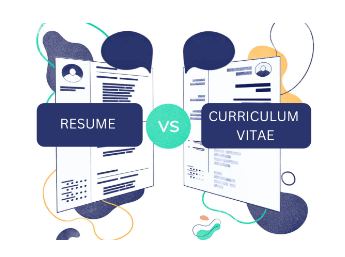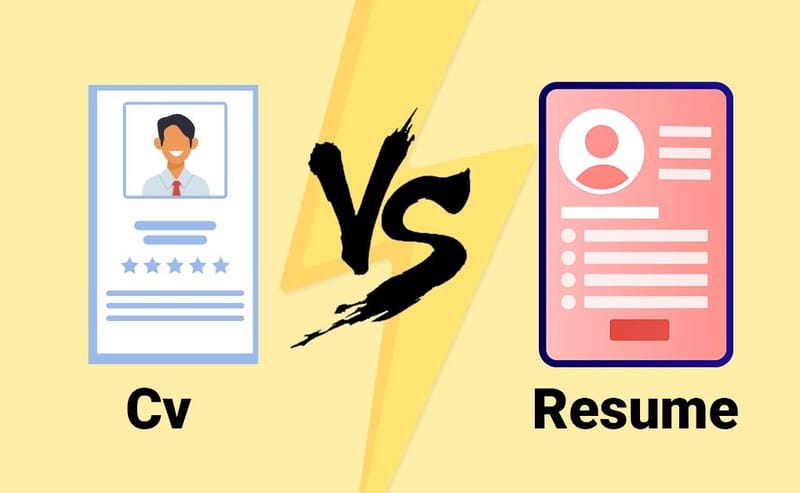Resume Vs Curriculum Vitae: When To Use Which
Contents

Imagine you're preparing for a job application. You've polished your English skills, ready to impress at the interview, but there's a problem - you're not sure whether to submit a resume or a curriculum vitae (CV). Sounds relatable? Fear not, because we're here to clear up the confusion.
The terms 'resume' and 'curriculum vitae' can seem interchangeable, but they're distinct in purpose and structure. A resume is typically one page long. It is a short summary of your skills and experiences relevant to the job you're applying for. On the other hand, a curriculum vitae is a detailed overview of your academic information, professional experiences and accomplishments, often covering several pages.
In this guide, we'll discuss these two essential tools of career growth in great detail. Join us as we unpack their differences and similarities, and understand when to use which.
What are Resume and Curriculum Vitae?
A resume, according to the Cambridge Dictionary, is a short document showcasing your skills, experience, and accomplishments relevant to the job you're applying for. It's your professional highlight reel, designed to grab an employer's attention quickly.
Typically, a resume includes:
Personal details
Career objectives
Educational qualifications
Work experience
Skills relevant to the job
References
For instance, if you are an Indian IT professional applying for a software developer position, your resume could focus on your coding skills, projects you've worked on, and the programming languages you're proficient in.
On the other hand, a Curriculum Vitae (CV) is much more comprehensive. Unlike a resume, a CV isn't tailored to specific jobs. Instead, it provides a detailed account of your complete career history. According to the Cambridge Dictionary, a CV is primarily used when applying for jobs in academia while a resume is used for other jobs.
A standard CV usually includes the following:
Personal details
Clear career summary or profile
Education history and achievements
Work experience
Skills
Hobbies and interests
References
For instance, an Indian academic may use a CV to detail their research work, areas of expertise, publications, and conferences attended - information that wouldn't typically fit into a resume.
Whether using a resume or curriculum vitae, remember that both should be neat, and easy to read with clear headings and bullets. While both serve similar functions, they are used in different contexts based on job requirements and career stages.
Major Differences Between Resume and Curriculum Vitae

Understanding the differences between a resume and a CV is crucial, especially since they serve different purposes. Here's a table comparing the two:
Resume | Curriculum Vitae (CV) | |
Length | Short; typically 1-2 pages | Detailed; often more than 2 pages |
Purpose | Summarises skills and experiences relevant to a specific job application | An in-depth document covering your entire career |
Layout | Customized based on job | Consistent layout across applications |
Consider this: you're applying for an IT consultant role with a major multinational company. For such specific roles, recruiters prefer resumes that summarise your relevant skills and experience.
On the other hand, if you're pursuing academic or research-based roles where comprehensive detail about your qualifications, publications or projects is essential, using a CV is more suitable.
Remember, knowing which document to use when applying for jobs can set you apart in competitive job markets. So understanding these differences matters greatly!
Enhancing Your Resume and CV
To make a powerful first impression, your resume or curriculum vitae (CV) must be perfect. Here are some tips to enhance these crucial documents:
Choosing the Right Document: Understanding the resume vs curriculum vitae- difference is vital. Resume vs. Curriculum Vitae: What's the Difference? Can provide insightful guidance.
Professional Language: Use formal, professional English language in your resume or CV.
Proofreading: To avoid mistakes, proofread your document multiple times.
Prioritise Relevance: Highlight your most relevant skills and experiences first.
Effective Verbs: Start each bullet point with a strong action verb like 'managed', 'led', or 'improved'.
Mastering English can significantly enhance the quality of your resume or CV, making it more attractive to potential employers. Fluency enables you to express your skills and experiences more effectively, clearly demonstrating your professionalism.
This is where Clapingo’s personalized one-on-one English coaching sessions can help you stand out. At Clapingo, experienced tutors guide you to improve fluency, pronunciation, and vocabulary, ensuring your language skills shine in these critical professional documents. You can also check out this interesting Clapingo article: Is Practicing Speaking English All it Takes to Advance Your Career?
Common Mistakes to Avoid
When crafting your resume or curriculum vitae (CV), simple errors can lead to significant drawbacks. Here are some common mistakes and how to avoid them:
1. Grammatical Errors and Typos: Every single word counts, so ensure you spell-check and review your grammar.
2. Lengthy Documents: Whether it's a resume or a CV, keep it short. Stick to one or two pages for a resume and three or four for a CV.
3. Lack of Specificity: Be specific about your skills, experiences, and achievements instead of using broad terms.
4. Irrelevant Information: Prepare your document according to the job you're applying for. Remove any irrelevant details.
5. Inconsistent Formatting: Maintain a consistent format throughout – this enhances readability.
Remember, the difference between a resume and a curriculum vitae lies in detail and length, but these mistakes apply to both. For more insights on avoiding errors during interviews, watch Clapingo's YouTube video:
Key Takeaways
In this blog, we've explored the significant differences between a resume and a curriculum vitae (CV). The resume vs curriculum vitae difference lies mainly in length, detail level, and purpose. A resume is a short document highlighting your skills and experience relevant to the specific job you’re applying for, while a CV is a detailed record of your entire career history.
Understanding these distinctions is crucial for Indian professionals aspiring for global opportunities. It empowers you to present yourself effectively to potential employers worldwide. Additionally, improving your English communication skills will also boost your opportunities.
Remember, for your progress in this journey, Clapingo can always help. Clapingo's mission is to help non-native English speakers in India improve their spoken English skills. Personalised coaching sessions tailored to your needs and conducted in your native language can help you overcome language barriers in professional and personal environments.
So stay positive! You have the potential to master English communication and unlock new professional heights!
FAQs:
1. What is the main difference between a resume and a CV?
The fundamental resume vs curriculum vitae difference lies in length, detail level and purpose. A resume is brief and tailored for each job application while a CV is detailed and covers your complete career history.
2. When should I use a CV instead of a resume?
Generally, use a CV when applying for positions in academia or research while resumes are preferred for most other job applications. However, it's best to follow what the specific job advertisement asks for.
3. How can improving my English benefit my professional growth?
Proficiency in English can significantly enhance your career prospects on an international level. It helps you communicate effectively in professional environments and opens up numerous opportunities globally.
Comments
Your comment has been submitted